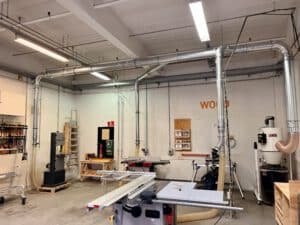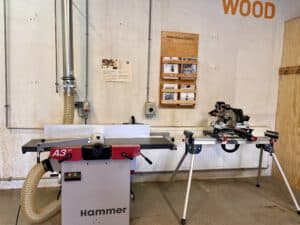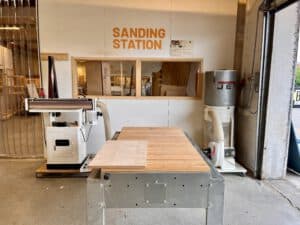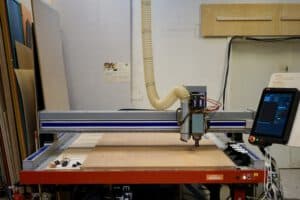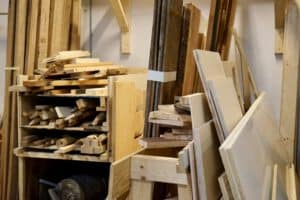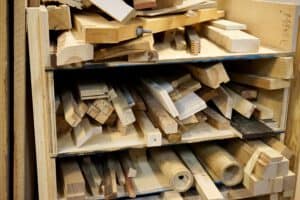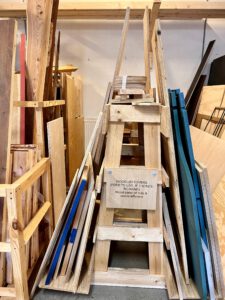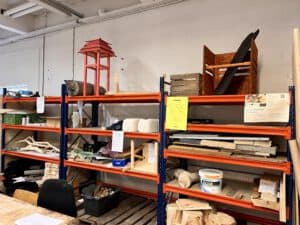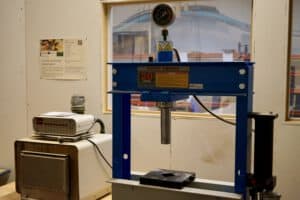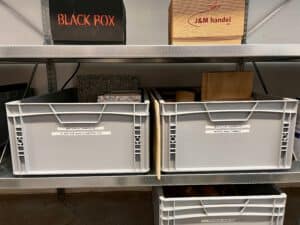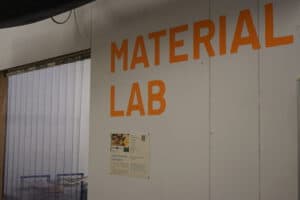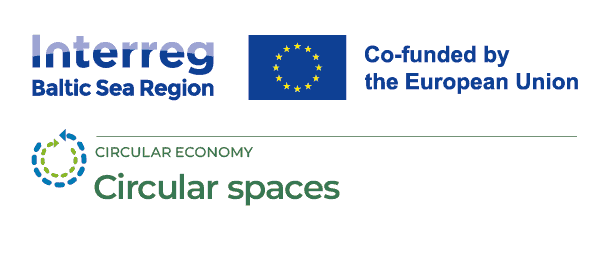
Maker’s Circular Transformation: Supporting circular design and local production
07 January 2025
As part of the Circular Spaces project, Maker has undertaken a significant transformation to enhance opportunities for working with recycled materials and supporting local production. The primary goal of this transformation is to reduce waste by creating internal systems for material sharing, upgrading our facilities to better process materials, and fostering a deeper understanding of circular design principles among our community. Additionally, through partnerships, we connect our members with “new waste” materials sourced from local industries, encouraging their reuse in new designs and products.
Guided by our mission to support circular design and local production, we’ve integrated circular design principles and infrastructure into our professional makerspace. This transformation enables our community to design, produce, and repair with a focus on local resources and more sustainable design practices.
Key upgrades as part of the transformation
The transformation has mainly focused on enhancing our woodworking capabilities through professional facilities, tools and circular practices. By investing in advanced machinery, work environment optimization and promoting material circularity, Maker is on a continuous journey to reimagine how makers, designers, and entrepreneurs interact with resources and materials.
Here are the key upgrades:
- Full-Sheet CNC machine with automatic tool change: Facilitates precise, waste-minimizing woodwork, making it easier to work with reclaimed and locally sourced materials.
- Enhanced dust collection: Improves air quality, enhances work safety, and ensures a clean, efficient workspace essential for woodworking.
- Material sharing systems: Industrial shelves, racks, and modules support the sharing and reuse of leftover materials, promoting a culture of resource efficiency and optimal material use.
- Workshop press for compressed materials: Allows for experimentation with creating new materials from waste, contributing to sustainable production practices.
- Leveling and thickness planer: Optimizes wood processing and consistent material quality, particularly when working with reclaimed wood, which often provides superior quality compared to virgin wood, due to slower growth.
- Sanding table: Ensures high-quality finishing for locally crafted products while reducing airborne particles for a cleaner work environment.
- Dust curtains (dust separation): Maintains a clean and safe workspace by containing dust within specific areas.
- Racks for sharing waste materials
- Racks for sharing waste materials
Value created through the transformation
This transformation has strengthened Maker’s ability to support circular design and local production, while fostering a resource-efficient and community-focused workspace. The following are ten key benefits:
- Minimized waste: Improved tools and sharing systems ensure materials are reused effectively, reducing overall waste.
- Support for sustainable design: Members have access to professional equipment that encourages the creation of long-lasting, and more sustainable products.
- Enhanced local production: The upgrades promote the use of locally sourced and reclaimed materials, reducing reliance on imported resources.
- Improved work environment: Better dust collection and separation create a healthier and more productive workspace.
- Material experimentation: The workshop press, material library and our material lab enables members to explore and experiment with new ways of repurposing waste materials.
- Lower costs: Material sharing reduces costs for members while supporting more affordable local production.
- Education in circular design: Hands-on experience with circular practices equips members and a public audience with skills to design and produce with circular material as a focal point.
- Community collaboration: Shared resources and upgraded facilities create opportunities for community collaboration as well as public events, programmes and workshops.
- Strengthened local economy: Promoting reuse and supporting local production contributes to economic resilience and sustainability in the community.
- An inspirational model: The transformation demonstrates how makerspaces can champion sustainable design and circular production on a local scale. This is applied as upgraded infrastructures and facilities, but also on training material and programmes.
Through this transformation, Maker has managed to reduce the attitude-behaviour gap and evolve into a space focusing on circular design and local production. By integrating circular practices, advanced tools, and resource-sharing systems, we are empowering our community to create responsibly while supporting a stronger local economy. This journey reflects our commitment to shaping a better tomorrow—one material, one project, and one collaboration at a time.
Auhor: Makerspace Maker team





